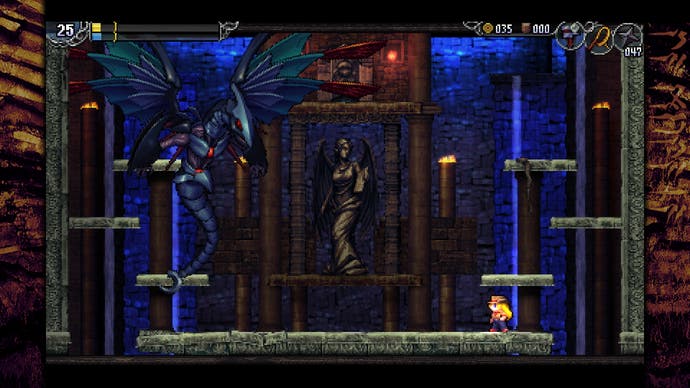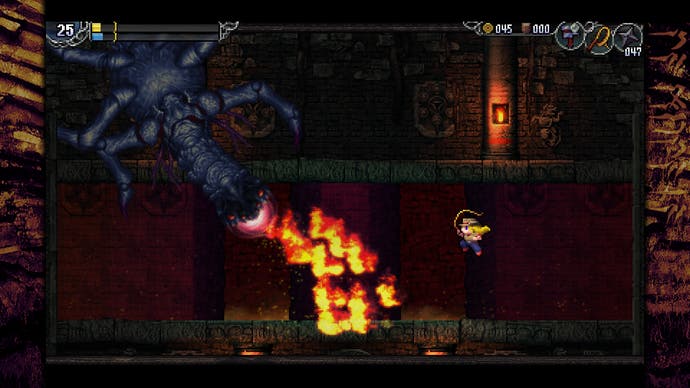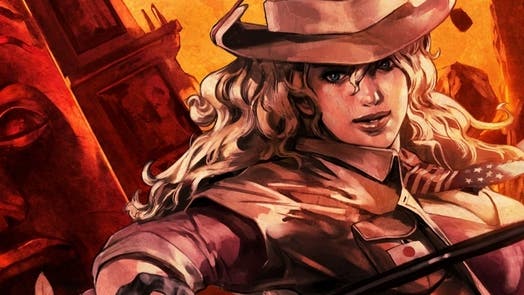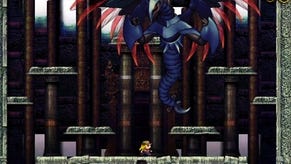Learning to understand the way La-Mulana 2 thinks
Learning very slowly, that is.
I have a theory - not one that I am willing to submit to much in the way of peer review - that games are often about learning new ways to think. No, not new ways - not quite. It's more that, in the moment-to-moment action of a game, in the individualised swirl of ways it likes to stage things or explain itself, you often get to see another mind in flight: you learn to think in the way that someone else has already been thinking.
This may be why the really big budget games often lose a little of their spark. With no singular mind behind them - not even a handful of singular minds - games sometimes rely on working out the way that you already think instead: they become students of your compulsions, of the ways that we all have the same cognitive biases. Anyway, what this whole thing really explains (to me at least) is why I've been enjoying La-Mulana 2 so much without making much in the way of progress. I am learning what the people who made this intricate, sometimes prankish kind of game value. I am learning to think like them. I am learning very slowly.
I bounced off the reputation of the first game as much as the actual game itself. By the time I came to La-Mulana it was a known quantity, and the thing I seemed to understand about it was that it was a game that is often played with a walkthrough open on a browser somewhere. Its brilliance had long since been explored and its personality had ossified into a list of things you had to look up in order to proceed. I know this shouldn't have put me off, but it did: my loss.

La-Mulana 2 however? I think the balance is slightly different. I'm coming to it at the same point as everyone else, so we can all be lost and frustrated and delighted by the instance of the fingerpost together. It helps that the basics are very basic indeed: jump, dodge spikes and whatnot, whack enemies with a whip. Over time, the game's true intricacies reveal themselves slowly, melting through the simple outer crust of a 2D platformer.
And man, those intricacies. I was aware going in that this was going to be a metroidvania - so backtracking, getting lost, getting new items that open up old paths, getting stuck on bosses. What I wasn't suspecting, though, was what appears to be the La-Mulana series' signature move - not its most frequent move, but the one that seems to define its sensibility. It's the sudden death that you could not have foreseen.
I will push a lever and then a stone will suddenly drop on me. Instant death. No way of telling it was going to happen. But maybe - maybe - this is actually a learning moment. Maybe the way that La-Mulana 2 likes to think is becoming clear. Maybe this isn't a case of: never push that lever again. Maybe it's a case of: now you know what that lever does, can't you work out a way to push it and somehow survive?
And look - there is a gap of a few seconds between pushing the lever and being hit by the rock. Enough to duck to the right and drop down a passageway? Equally, another sudden death from above: no lever this time, but is there another way across this bridge, another way that does not involve actually stepping on it?

The lessons here! There are so many of them. Well, two at least, which feels like so many on a Thursday morning after restless sleep in which I have been dreaming of La-Mulana 2.
Firstly, this is a game that encourages you to learn by dying: you learn how not to die the next time. Secondly, this is a game that wants you to be alert to the fact that you are exploring a world that is tricksy and unfair. You will find that the ground beneath you is not always solid, and that the things you have to do to advance are not always clearly signposted. I wonder if the original La-Mulana had such an impact on its players for the same reason that Lordran sticks in the mind. Unlike other games, you have to pay such constant attention to your surroundings. You have to truly learn the game's world as well as its mechanics. This is why the walkthrough approach is so unmoving. You are bypassing the real fun, which is watching everything the game does until the moment you can predict something that you cannot actually see. La-Mulana wants you to develop hunches.
An unfair world that you survive by developing hunches. The weird thing about so many metroidvanias is that, when delivered with skill but little passion, they can feel like the most artificial games around - a world devoid of anything but locks and keys. But because La-Mulana's world is so willing to spring cruelties upon you that are not obviously signposted, it feels less like a collection of mechanics and more like an actual place, with a history that has been forgotten, and with a selection of nasty tricks that have been placed with no thought of fairness or clarity or any of those other things that can make games feel artificial. This, I think, is the sort of thing that's worth thinking about.



